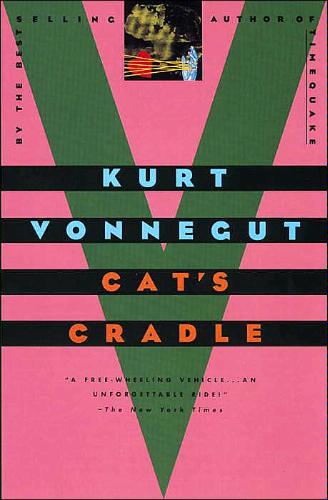 “Call me Jonah,” begins Kurt Vonnegut’s satirical novel, “Cat’s Cradle” (1963). Famous first words, almost as memorable as Herman Melville’s “Moby Dick.”
“Call me Jonah,” begins Kurt Vonnegut’s satirical novel, “Cat’s Cradle” (1963). Famous first words, almost as memorable as Herman Melville’s “Moby Dick.”
And like “Moby Dick’s” Ishmael, the writer Jonah (whose real name is John) embarks on a journey. His is to catalog “The Day the World Ended,” or rather, the day the U.S. bombed Hiroshima. And since bomb creator Dr. Felix Hoenikker’s dead, Jonah tracks down his three living children: the midget Newt, a tall horse-faced blond named Angela (I’m picturing SNL’s Kate McKinnon in this video) and the U.S. fugitive Frank.
This is where the tale turns absurd. The Bible’s Jonah, the son of Amittai (Hebrew for “truth”), was swallowed by a whale, remember?
But while there’s no literal whale’s in this story, the metaphor’s there. Like Captain Ahab, Jonah searches for his “great white whale.” And that truth leads him to the Hoenikker kids, who carry their father’s legacy.
Dr. Manhattan left one inconvenient invention (which also caused his untimely death): the ice-nine, a block of ice which freezes everything its dropped in. That’s what Newt and Angela hold when Jonah meets them on his way to the fictional Caribbean island of San Lorenzo.
Newt and Angela are there to see their brother’s engagement to the island princess Mona. Frank’s now a general serving at the pleasure of San Lorenzo’s dying president, “Papa” Monzano.
But God’s ways are as mysterious as the island’s main religion Bokononism. And religion turns out to be the “great white whale” Jonah’s searching for.
Invented by a prophet with the surname of Johnson, Bokononism served as the island dweller’s “one real instrument of hope.”
“Truth was the enemy of the people, because the truth was so terrible, so Bokonon made it his business to provide the people with better and better lies,” says San Lorenzo’s historian.
Those cynical words may seem blasphemous to firm religious believers, but those “lies” spell some truth.
In 300-some pages, Vonnegut shows us the absurdity of life and the meaning in a meaningless world.